Written by Barb Weigel, Independent Living Project Specialist, Iowa Department for the Blind
Kathryn Hovey of Charles City could be considered your typical senior citizen. She was born on a farm in 1931 and, upon graduating from high school, began working full-time. She took time away from work to raise four children but eventually went back to working full time until retiring in 2003. As a self-proclaimed “busybody”, she was busier in retirement than when she worked full time, until her vision loss worsened.
In the late 1980s, Kathryn began experiencing vision loss due to Macular Degeneration. Although the vision loss made it more difficult to perform certain tasks at work, it wasn’t enough to result in early retirement. She found ways to adjust and was able to keep working. It wasn’t until 5 years after retirement, that her vision loss started to affect her independence. Her ability to remain a “busybody” was in jeopardy.
“I felt like I was doomed. I had a lot of frustrations.” Kathryn had begun to rely more on family and she didn’t like it. Upon seeking answers from her ophthalmologist in late 2010, he encouraged her to contact the Iowa Department for the Blind (IDB) for help.
Kathryn and I met in November, 2010. Kathryn was soft spoken and reserved. She didn’t have much emotion during conversation. She wasn’t sure what to expect from services but expressed difficulty with plugging her coffee pot and other appliances into outlets, doing her beloved crafts, reading her mail, managing her finances, and setting her appliances. The first thing we addressed was the coffee pot. She tried it visually and struggled. Her frustration was evident. I asked her to close her eyes and explained how to do it by feel. Success! She tried several times and, each time, plugged it in with ease. She was pleased!
Also at our first visit, we marked her oven, microwave, washer and dryer so she could set them by touch rather than struggling to read them. She again was very pleased to have an easy solution to these frustrating tasks. As we discussed more frustrations, we decided to enlarge commonly used phone numbers. I provided her with a set of writing guides so she could again create grocery lists, address envelopes, fill out checks and sign her name. I also provided her with a set of super jumbo playing cards so she could play solitaire again.
At our next meeting, Kathryn learned to thread a needle without vision and we marked additional features on her oven and thermostat. She also explored handheld magnifiers to assist her with reading her mail. It was within these first two visits that Kathryn began to realize she can do things for herself and doesn’t have to rely on family. She could regain her independence. As a result, we agreed to complete an application and, put in writing, the goals she wanted to accomplish (referred to as a plan). And we set out to accomplish them!
Throughout the course of services, Kathryn has accomplished a lot! We marked items around the home (i.e. canned goods) for independent identification. She also developed a method for identifying her house key among the many other keys on her key ring. She uses adapted paper for creating grocery lists and taking phone messages; a large print calendar to track appointments; a talking calculator to balance her checkbook; audio books and magazines to continue with her love of reading; and uses a talking watch and alarm clock to tell time. Kathryn has also resumed her craft projects, identifies her money by the way she has it folded, cooks meals for herself, has started participating in her local senior center as her busy schedule allows and much more. She agrees these adapted methods allow her “to perform a lot of duties… [things] I don’t have to do, but I want to do. And I want to say ‘I can do!’
Possibly the biggest change in Kathryn is her attitude. Before IDB services, she admits “I was a grouch. I was feeling a bit sorry for myself. I felt like I was doomed.” When Kathryn’s eye doctor explained there are millions of people with Macular Degeneration and that each person has to cope with it in their own way, her attitude began to change. She thought, “I have to take the cards I am dealt and play them the best way I know how” and she took a proactive approach to vision loss and that led her to IDB.
Today, Kathryn is full of smiles and excitement. She laughs, jokes and is eager to tell about all the things she’s done since our last visit. “The things you think are mission impossible are not if you really want to do it.” If there is something she is having difficulty with, she figures out a solution. She no longer lets her vision loss stop her. Looking back, she says IDB services have been “a Godsend” and says “I appreciate all the help I have gotten through the Iowa Department for the Blind. I highly recommend them.”
One of Kathryn’s favorite poems is “I Can.” She refers to it often. She has come a long way in a few short months and her attitude and determination play a big part in where she is today.
I Can
I can be anything.
I can do anything.
I can think anything
Big or tall or high or low
Wide or narrow,
Fast or slow.
Because I can
And I want to!
- Mari Evans
